Banksy
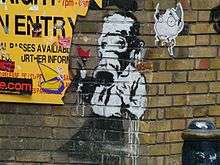
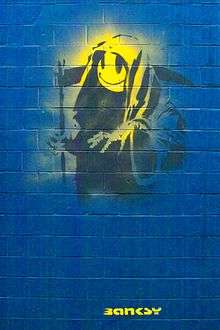
Banksy is an England-based graffiti artist, political activist and film director of unverified identity. His satirical street art and subversive epigrams combine dark humour with graffiti executed in a distinctive stenciling technique. His works of political and social commentary have been featured on streets, walls, and bridges of cities throughout the world.[1] Banksy's work grew out of the Bristol underground scene, which involved collaborations between artists and musicians.[2] Banksy says that he was inspired by "3D", a graffiti artist who later became a founding member of the English musical group Massive Attack.[3]
Banksy displays his art on publicly visible surfaces such as walls and self-built physical prop pieces. Banksy does not sell photographs or reproductions of his street graffiti, but art auctioneers have been known to attempt to sell his street art on location and leave the problem of its removal in the hands of the winning bidder.[4] Banksy's first film, Exit Through the Gift Shop, billed as "the world's first street art disaster movie", made its debut at the 2010 Sundance Film Festival.[5] The film was released in the UK on 5 March 2010.[6] In January 2011, he was nominated for the Academy Award for Best Documentary for the film. In 2014, he was awarded Person of the Year at the 2014 Webby Awards.[7]
Career
Early career (1990–2001)
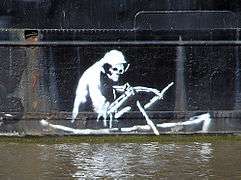
Banksy started as a freehand graffiti artist in 1990–1994[9] as one of Bristol's DryBreadZ Crew (DBZ), with two other artists known as Kato and Tes.[10] He was inspired by local artists and his work was part of the larger Bristol underground scene with Nick Walker, Inkie and 3D.[11][12] During this time he met Bristol photographer Steve Lazarides, who began selling Banksy's work, later becoming his agent.[13] By 2000 he had turned to the art of stencilling after realising how much less time it took to complete a work. He claims he changed to stencilling while he was hiding from the police under a rubbish lorry, when he noticed the stencilled serial number[14] and by employing this technique, he soon became more widely noticed for his art around Bristol and London.[14] He played football with the Easton Cowboys and Cowgirls in the 1990s and toured with the club to Mexico in 2001.[15] Banksy's first known large wall mural was The Mild Mild West painted in 1997 to cover advertising of a former solicitors' office on Stokes Croft in Bristol. It depicts a teddy bear lobbing a Molotov cocktail at three riot police.[16]
Banksy's stencils feature striking and humorous images occasionally combined with slogans. The message is usually anti-war, anti-capitalist or anti-establishment. Subjects often include rats, apes, policemen, soldiers, children, and the elderly.
In July 2011 one of Banksy's early works, Gorilla in a Pink Mask, which had been a prominent landmark on the exterior wall of a former social club in Eastville for over ten years, was unwittingly painted over after the premises became a Muslim cultural centre.[17][18]
Exhibitions (2002–2003)
On 19 June 2002, Banksy's first Los Angeles exhibition debuted at 33 1⁄3 Gallery, a tiny Silver Lake venue owned by Frank Sosa. The exhibition, entitled Existencilism, was curated by 33 1⁄3 Gallery, Malathion LA's Chris Vargas, Funk Lazy Promotions' Grace Jehan, and B+.[19]
In 2003, at an exhibition called Turf War, held in a London warehouse, Banksy painted on animals. At the time he gave one of his very few interviews, to the BBC's Nigel Wrench.[20] Although the RSPCA declared the conditions suitable, an animal rights activist chained herself to the railings in protest.[21] An example of his subverted paintings is Monet's Water Lily Pond, adapted to include urban detritus such as litter and a shopping trolley floating in its reflective waters; another is Edward Hopper's Nighthawks, redrawn to show that the characters are looking at a British football hooligan, dressed only in his Union Flag underpants, who has just thrown an object through the glass window of the cafe. These oil paintings were shown at a twelve-day exhibition in Westbourne Grove, London in 2005.[22]
Banksy, along with Shepard Fairey, Dmote and others created work at a warehouse exhibition in Alexandria, Sydney for Semi-Permanent in 2003. Approximately 1,500 people attended.
£10 notes to Barely Legal (2004–2006)
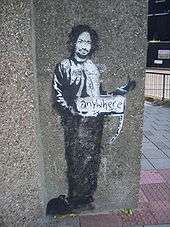
In August 2004, Banksy produced a quantity of spoof British £10 notes substituting the picture of the Queen's head with Diana, Princess of Wales's head and changing the text "Bank of England" to "Banksy of England". Someone threw a large wad of these into a crowd at Notting Hill Carnival that year, which some recipients then tried to spend in local shops. These notes were also given with invitations to a Santa's Ghetto exhibition by Pictures on Walls. The individual notes have since been selling on eBay for about £200 each. A wad of the notes were also thrown over a fence and into the crowd near the NME signing tent at The Reading Festival. A limited run of 50 signed posters containing ten uncut notes were also produced and sold by Pictures on Walls for £100 each to commemorate the death of Princess Diana. One of these sold in October 2007 at Bonhams auction house in London for £24,000.[23]
In August 2005, Banksy, on a trip to the Palestinian territories, created nine images on the Israeli West Bank wall.[24]
Banksy held an exhibition called Barely Legal, billed as a "three-day vandalised warehouse extravaganza" in Los Angeles, on the weekend of 16 September 2006. The exhibition featured a live "elephant in a room", painted in a pink and gold floral wallpaper pattern, which, according to leaflets handed out at the exhibition, was intended to draw attention to the issue of world poverty. Although the Animal Services Department had issued a permit for the elephant, after complaints from animal rights activists, the elephant appeared unpainted on the final day. Its owners rejected claims of mistreatment and said that the elephant had done "many, many movies. She's used to makeup."[25] Banksy also made artwork displaying Queen Victoria as a lesbian and satirical pieces that incorporated art made by Andy Warhol and Leonardo da Vinci.[26]
The Banksy effect (2006–2007)
There are crimes that become innocent and even glorious through their splendour, number and excess.
Banksy[27]
After Christina Aguilera bought an original of Queen Victoria as a lesbian and two prints for £25,000,[28] on 19 October 2006, a set of Kate Moss paintings sold in Sotheby's London for £50,400, setting an auction record for Banksy's work. The six silk-screen prints, featuring the model painted in the style of Andy Warhol's Marilyn Monroe pictures, sold for five times their estimated value. His stencil of a green Mona Lisa with real paint dripping from her eyes sold for £57,600 at the same auction.[29] In December, journalist Max Foster coined the phrase, "the Banksy effect", to illustrate how interest in other street artists was growing on the back of Banksy's success.[30]
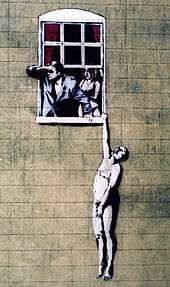
On 21 February 2007, Sotheby's auction house in London auctioned three works, reaching the highest ever price for a Banksy work at auction: over £102,000 for his Bombing Middle England. Two of his other graffiti works, Balloon Girl and Bomb Hugger, sold for £37,200 and £31,200 respectively, which were well above their estimated prices.[32] The following day's auction saw a further three Banksy works reach soaring prices: Ballerina with Action Man Parts reached £96,000; Glory sold for £72,000; Untitled (2004) sold for £33,600; all significantly above estimated values.[33] To coincide with the second day of auctions, Banksy updated his website with a new image of an auction house scene showing people bidding on a picture that said, "I Can't Believe You Morons Actually Buy This Shit."[34] In February 2007, the owners of a house with a Banksy mural on the side in Bristol decided to sell the house through Red Propeller art gallery after offers fell through because the prospective buyers wanted to remove the mural. It is listed as a mural that comes with a house attached.[35] In 2008, Nathan Wellard and Maev Neal, a couple from Norfolk, UK, made headlines in Britain when they decided to sell their mobile home that contains a 30-foot mural, entitled Fragile Silence, done by Banksy a decade prior to his rise to fame. According to Nathan Wellard, Banksy had asked the couple if he could use the side of their home as a "large canvas", to which they agreed. In return for the "canvas", the Bristol stencil artist gave them two free tickets to the Glastonbury Festival. The mobile home purchased by the couple 11 years ago for 1,000 GBP, is now being sold for 500,000 GBP.[36]
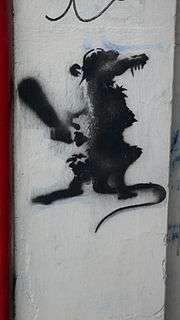
In April 2007, Transport for London painted over Banksy's image of a scene from Quentin Tarantino's film Pulp Fiction (1994), featuring Samuel L. Jackson and John Travolta clutching bananas instead of guns.[37] Although the image was very popular, Transport for London claimed that the graffiti created "a general atmosphere of neglect and social decay which in turn encourages crime" and their staff are "professional cleaners not professional art critics".[38] Banksy painted the same site again and, initially, the actors were portrayed as holding real guns instead of bananas, but they were adorned with banana costumes. Some time later, Banksy made a tribute artwork over this second Pulp Fiction work. The tribute was for 19-year-old British graffiti artist Ozone who, along with fellow artist Wants, was hit by an underground train in Barking, east London on 12 January 2007.[39] Banksy depicted an angel wearing a bullet-proof vest holding a skull. He also wrote a note on his website saying:
The last time I hit this spot I painted a crap picture of two men in banana costumes waving hand guns. A few weeks later a writer called Ozone completely dogged it and then wrote "If it's better next time I'll leave it" in the bottom corner. When we lost Ozone we lost a fearless graffiti writer and as it turns out a pretty perceptive art critic. Ozone – rest in peace.[40]
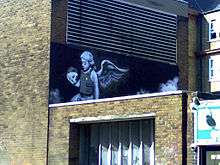
On 27 April 2007, a new record high for the sale of Banksy's work was set with the auction of the work Space Girl and Bird fetching £288,000 (US$576,000) around 20 times the estimate at Bonhams of London.[41] On 21 May 2007 Banksy gained the award for Art's Greatest living Briton. Banksy, as expected, did not turn up to collect his award and continued with his anonymous status. On 4 June 2007, it was reported that Banksy's The Drinker had been stolen.[42][43] In October 2007, most of his works offered for sale at Bonhams auction house in London sold for more than twice their reserve price.[44]
Banksy has published a "manifesto" on his website.[45] The text of the manifesto is credited as the diary entry of British Lieutenant Colonel Mervin Willett Gonin, DSO, which is exhibited in the Imperial War Museum. It describes how a shipment of lipstick to the Bergen-Belsen concentration camp immediately after its liberation at the end of World War II helped the internees regain their humanity. However, as of 18 January 2008, Banksy's Manifesto has been substituted with Graffiti Heroes No.03 that describes Peter Chappell's graffiti quest of the 1970s that worked to free George Davis of his imprisonment.[45] By 12 August 2009 he was relying on Emo Philips' "When I was a kid I used to pray every night for a new bicycle. Then I realised God doesn't work that way, so I stole one and prayed for forgiveness." A small number of Banksy's works can be seen in the movie Children of Men, including a stenciled image of two policemen kissing and another stencil of a child looking down a shop.[46]
Banksy, who "is not represented by any of the commercial galleries that sell his work second hand (including Lazarides Ltd, Andipa Gallery, Bank Robber, Dreweatts etc.)",[47] claims that the exhibition at Vanina Holasek Gallery in New York City (his first major exhibition in that city) is unauthorised. The exhibition featured 62 of his paintings and prints.[48]
2008
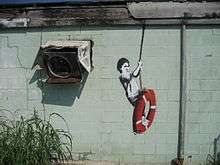
In March, a stencilled graffiti work appeared on Thames Water tower in the middle of the Holland Park roundabout, and it was widely attributed to Banksy. It was of a child painting the tag "Take this—Society!" in bright orange. London Borough of Hammersmith and Fulham spokesman, Councillor Greg Smith branded the art as vandalism, and ordered its immediate removal, which was carried out by H&F council workmen within three days.[49]

In late August 2008, marking the third anniversary of Hurricane Katrina and the associated levee failure disaster, Banksy produced a series of works in New Orleans, Louisiana, mostly on buildings derelict since the disaster.[50] A stencil painting attributed to Banksy appeared at a vacant petrol station in the Ensley neighbourhood of Birmingham, Alabama on 29 August as Hurricane Gustav approached the New Orleans area. The painting, depicting a hooded member of the Ku Klux Klan hanging from a noose, was quickly covered with black spray paint and later removed altogether.[51] His first official exhibition in New York City, "The Village Pet Store and Charcoal Grill", opened 5 October 2008. The animatronic pets in the store window include a mother hen watching over her baby Chicken McNuggets as they peck at a barbecue sauce packet, and a rabbit putting makeup on in a mirror.[52]
The Westminster City Council stated in October 2008 that the work One Nation Under CCTV, painted in April 2008 would be painted over as it was graffiti. The council said it would remove any graffiti, regardless of the reputation of its creator, and specifically stated that Banksy "has no more right to paint graffiti than a child". Robert Davis, the chairman of the council planning committee told The Times newspaper: "If we condone this then we might as well say that any kid with a spray can is producing art."[53] The work was painted over in April 2009. In December 2008, The Little Diver, a Banksy image of a diver in a duffle coat in Melbourne Australia was destroyed. The image had been protected by a sheet of clear perspex; however, silver paint was poured behind the protective sheet and later tagged with the words "Banksy woz ere". The image was almost completely obliterated.[54]
The Cans Festival (2008)
In London, over the weekend 3–5 May 2008, Banksy hosted an exhibition called The Cans Festival. It was situated on Leake Street, a road tunnel formerly used by Eurostar underneath London Waterloo station. Graffiti artists with stencils were invited to join in and paint their own artwork, as long as it did not cover anyone else's.[55] Banksy invited artists from around the world to exhibit their works.[56]
2009
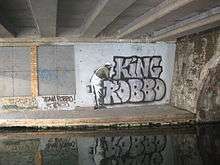
In May 2009, Banksy parted company with agent Steve Lazarides and announced that Pest Control,[57] the handling service who act on his behalf, would be the only point of sale for new works. On 13 June 2009, the Banksy vs Bristol Museum show opened at Bristol City Museum and Art Gallery, featuring more than 100 works of art, including animatronics and installations; it is his largest exhibition yet, featuring 78 new works.[58][59] Reaction to the show was positive, with over 8,500 visitors to the show on the first weekend.[60] Over the course of the twelve weeks, the exhibition was visited over 300,000 times.[61] In September 2009, a Banksy work parodying the Royal Family was partially destroyed by Hackney Council after they served an enforcement notice for graffiti removal to the former address of the property owner. The mural had been commissioned for the 2003 Blur single "Crazy Beat" and the property owner, who had allowed it to be painted, was reported to have been in tears when she saw it was being painted over.[62]
In December 2009, Banksy marked the end of the 2009 United Nations Climate Change Conference by painting four murals on global warming. One included the phrase, "I don't believe in global warming;" the words were submerged in water.[63] A feud and graffiti war between Banksy and King Robbo broke out when Banksy allegedly painted over one of Robbo's tags. The feud has led to many of Banksy's works being altered by graffiti writers.[64]
Exit Through the Gift Shop (2010)
The world premiere of the film Exit Through the Gift Shop occurred at the Sundance Film Festival in Park City, Utah, on 24 January. He created 10 street artworks around Park City and Salt Lake City to tie in with the screening.[65] In February, The Whitehouse public house in Liverpool, England, was sold for £114,000 at auction. The side of the building has an image of a giant rat by Banksy.[66]
In March 2010, the work "Forgive Us Our Trespassing" was displayed at the London Bridge in conjunction with Art Below an arts company that put on art shows on the London Underground. The work was censored by the Transport for London (TfL), forbidding display of the work with its halo, because of the prevalence of graffiti in the underground.[67] It was displayed without the halo over the boy's head, but after a few days the halo was repainted by a graffitist, so the TfL disposed of the poster. This decline went through the press and several articles were published remarking on the progress of the poster.[67][68]
Banksy paints over the line between aesthetics and language, then stealthily repaints it in the unlikeliest of places. His works, whether he stencils them on the streets, sells them in exhibitions or hangs them in museums on the sly, are filled with wit and metaphors that transcend language barriers.
Shepard Fairey writing for Time on Banksy's entry in the Time 100 list, April 2010[69]
In April, to coincide with the premiere of Exit Through the Gift Shop in San Francisco, five of his works appeared in various parts of the city.[70] Banksy reportedly paid a San Francisco Chinatown building owner $50 for the use of their wall for one of his stencils.[71] In early May 2010, seven new Banksy works of art appeared in Toronto, Ontario, Canada,[72] though most have been subsequently painted over or removed.
In May, to coincide with the premiere of Exit Through the Gift Shop in Royal Oak, Banksy visited the Detroit area and left his mark in several places in Detroit and Warren.[73] Shortly after, his work depicting a little boy holding a can of red paint next to the words "I remember when all this was trees" was excavated by the 555 Nonprofit Gallery and Studios. They claim that they do not intend to sell the work but plan to preserve it and display it at their Detroit gallery.[74] There was also an attempted removal of one of the Warren works known as "Diamond Girl".[75]
In late January 2011, Exit Through the Gift Shop was nominated for a 2010 Oscar for Best Documentary Feature.[76] Banksy released a statement about the nomination, where he said, "This is a big surprise... I don't agree with the concept of award ceremonies, but I'm prepared to make an exception for the ones I'm nominated for. The last time there was a naked man covered in gold paint in my house, it was me."[77] Leading up to the Oscars, Banksy blanketed Los Angeles with street art. Many people speculated if Banksy would show up at the Oscars in disguise and make a surprise appearance if he won the Oscar. Exit Through the Gift Shop did not win the award, which went to Inside Job. In early March 2011, Banksy responded to the Oscars with an artwork in Weston-super-Mare, UK, of a little girl holding the Oscar and pouting. Many people think that it is in reference to 15-month-old Lara, who dropped and damaged her father's (The King's Speech co-producer Simon Egan) Oscar statue.[78] Exit Through the Gift Shop was broadcast on British public television station Channel 4 on 13 August 2011.
Banksy was also credited with the opening couch gag for the 2010 The Simpsons episode "MoneyBart", depicting people working in deplorable conditions and using endangered or mythical animals to make both the episodes cel-by-cel and the merchandise connected with the program.[79] His name appears several times throughout the episode's opening sequence, spray-painted on assorted walls and signs. Fox sanitised parts of the opening "for taste" and to make it less grim. In January 2011, Banksy published the original storyboard on its website.[80] According to Banksy, the storyboard "led to delays, disputes over broadcast standards and a threatened walk out by the animation department." Executive director Al Jean jokingly said, "This is what you get when you outsource."[79]
2011
In May 2011 Banksy released a lithographic print which showed a smoking petrol bomb contained in a 'Tesco Value' bottle. This followed a long running campaign by locals against the opening of a Tesco Express supermarket in Banksy's home city of Bristol. Violent clashes had taken place between police and demonstrators in the Stokes Croft area. Banksy produced the poster ostensibly to raise money for local groups in the Stokes Croft area and to raise money for the legal defence of those arrested during the riots. The posters were sold exclusively at the Bristol Anarchists Bookfair in Stokes Croft for £5 each.
In December, he unveiled Cardinal Sin at the Walker Art Gallery, Liverpool. The bust, which replaces a priest's face with a "pixelated" effect, was a statement on the child abuse scandal in the Catholic Church.[81]
2012
In May his Parachuting Rat, painted in Melbourne in the late 1990s, was accidentally destroyed by plumbers installing new pipes.[82]
In July, prior to the 2012 Olympic Games Banksy posted photographs of paintings with an Olympic theme on his website but did not disclose their location.[83][84]
2013
On 18 February, BBC News reported that a recent Banksy mural, known as the Slave Labour mural portraying a young child sewing Union Flag bunting (created around the time of the Diamond Jubilee of Elizabeth II) had been removed from the side of a Poundland store in Wood Green, north London, and soon appeared for sale in Fine Art Auctions Miami's catalogue (a US auction site based in Florida). News of this has reportedly caused "lots of anger" in the local community and is considered by some to be a theft. Fine Art Auctions Miami has rejected claims of theft, saying it had signed a contract with a "well-known collector" and that "everything was above board"; despite this, the local Councillor for Wood Green is campaigning for the work's return.[85]
On the scheduled day of the auction, Fine Art Auctions Miami announced that it had withdrawn the work of art from the sale.[86]
On 11 May, BBC News reports that the same Banksy mural is up for auction again in Covent Garden by the Sincura Group. The auction is scheduled to take place in June. It is expected to fetch up to £450,000.[87] On 24 September, after over a year since his previous piece, a new Banksy mural went up on his website along with the subtitle 'Better Out Than In'.
Better Out Than In (2013)
On 1 October, Banksy began a one-month "show on the streets of New York [City]", for which he opened a separate website[88] and granted an interview to The Village Voice via his publicist.[89]
A pop-up boutique of about 25 spray-art canvases appeared on Fifth Avenue near Central Park on 12 October. Tourists were able to buy Banksy art for just $60 each. In a note posted to his website, the artist wrote: "Please note this was a one-off. The stall will not be there again." The BBC estimated that the street-stall art pieces could be worth as much as $31,000. The booth was manned by an unknown elderly man who went about four hours before making a sale, yawning and eating lunch as people strolled by without a second glance at the work. Banksy chronicled the surprise sale in a video posted to his website noting, "Yesterday I set up a stall in the park selling 100% authentic original signed Banksy canvases. For $60 each."[90][91][92] Two of the canvasses sold at a July 2014 auction for $214,000.[93]
It was reported that then-New York City Mayor Michael Bloomberg called Banksy a vandal whose work is not the definition of art, and that the NYPD's vandal squad was on the hunt for Banksy over his various graffiti art and installations.[94][95][96] One creation was a fiberglass sculpture of Ronald McDonald and a real person, barefoot and in ragged clothes, shining the oversized shoes of Ronald McDonald. The sculpture was unveiled in Queens but moved outside a different McDonald's around the city every day.[97][98][99] Other works included a YouTube video showing what appears to be footage of jihadist militants shooting down an animated Dumbo the Elephant; travelling installations that toured the city including a slaughterhouse delivery truck full of stuffed animals and a waterfall; and a modified painting donated to a charity shop which was later sold in an online auction for $615,000.[100][101] Banksy also posted a mock-up of a New York Times op-ed attacking the design of the One World Trade Center after the Times rejected his submission.[102][103] The residency in New York concluded on 31 October 2013;[100][104] many of the pieces, though, were either vandalised, removed or stolen.[105][106]
2015
'Banksy in Gaza' clip
In February 2015 Banksy published a 2-minute video titled "Make this the year YOU discover a new destination" about his trip to Gaza Strip. During his visit he has painted a few artworks including a kitten on the remains of a house destroyed by an Israeli air strike. ("I wanted to highlight the destruction in Gaza by posting photos on my website—but on the internet people only look at pictures of kittens") and a swing hanging off a watchtower. In a statement to the New York Times his publicist said,
I don't want to take sides. But when you see entire suburban neighborhoods reduced to rubble with no hope of a future—what you're really looking at is a vast outdoor recruitment center for terrorists. And we should probably address this for all our sakes.[107]
Dismaland
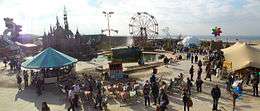
Banksy opened Dismaland, a large scale group show lampooning Disneyland on 21 August 2015 and permanently closed on 27 September 2015. The "theme park" was located in Weston-super-Mare, United Kingdom.[108][109] According to the Dismaland website artists Damien Hirst and Jenny Holzer were represented in the show.[110]
The Son of a Migrant from Syria
In December 2015, Banksy created several murals in the vicinity of Calais, France, including the so-called "Jungle" where migrants live as they attempt to enter the United Kingdom. His piece The Son of a Migrant from Syria depicts Steve Jobs as a migrant.[111]
Identity
Banksy's name and identity remain unknown - it has been stated that the reason for this secrecy is that graffiti is a crime.[112]
A commonly cited 2008 Mail on Sunday investigation of several former schoolmates and associates stated that he is believed to be Robin Gunningham, a former pupil at the public Bristol Cathedral School.[113][114] This suggestion was corroborated in 2016 by a study of the locations in which Banksy's art has been found, which found that the incidence of Banksy's works correlated with the known movements of Gunningham.[115][116]
There has also been speculation that Banksy is a woman, or that Banksy is a team of seven artists.[117] In October 2014 an internet hoax circulated that Banksy had been arrested and his identity revealed.[118]
In August 2016, Scottish journalist Craig Williams published an investigative piece in which he connected the timing of Banksy's murals with the touring schedule of the trip hop band Massive Attack.[119] Williams put forward the suggestion that Banksy's work could be the work of a collective, and that Banksy himself may be Massive Attack's frontman, Robert Del Naja.[120][121] Del Naja had been a graffiti artist during the 1980s prior to forming the band and had previously been identified as a personal friend of Banksy.[119]
Cultural icon
As of 2014, Banksy was regarded as a British cultural icon, with young adults from abroad naming the artist among a group of people that they most associated with UK culture, which included William Shakespeare, Queen Elizabeth II, David Beckham, The Beatles, Charlie Chaplin, J. K. Rowling, Elton John and Adele.[122][123]
Other notable artworks
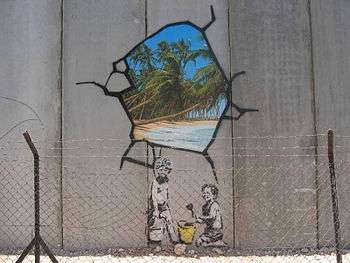
_(geograph_3944289).jpg)
In addition to his artwork, Banksy has claimed responsibility for a number of high-profile artworks, including the following:
- At London Zoo, he climbed into the penguin enclosure and painted "We're bored of fish" in 7-foot-high (2.1 m) letters.[124]
- At London Zoo, he left the message "I want out. This place is too cold. Keeper smells. Boring, boring, boring." in the elephant enclosure.[125]
- In March 2005, he placed subverted artworks in the Museum of Modern Art, Metropolitan Museum of Art, and American Museum of Natural History in Manhattan as well as the Brooklyn Museum in Brooklyn.[126]
- In May 2005 Banksy's version of a primitive cave painting depicting a human figure hunting wildlife while pushing a shopping trolley was hung in gallery 49 of the British Museum, London.[127]
- In August 2005, Banksy painted nine images on the Israeli West Bank barrier, including an image of a ladder going up and over the wall and an image of children digging a hole through the wall.[24][128][129][130]
- In October 2005, Banksy designed six station IDs for Nickelodeon.[131]
- In April 2006, Banksy created a sculpture based on a crumpled red phone box with a pickaxe in its side, apparently bleeding, and placed it in a side street in Soho, London. It was later removed by Westminster Council."[132]
- In June 2006, Banksy created an image of a naked man hanging out of a bedroom window on a wall visible from Park Street in central Bristol. The image sparked "a heated debate",[133] with the Bristol City Council leaving it up to the public to decide whether it should stay or go.[134] After an internet discussion in which 97% of the 500 people surveyed supported the stencil, the city council decided it would be left on the building.[133] The mural was later defaced with blue paint.[135]
- In August/September 2006, Banksy placed up to 500 copies of Paris Hilton's debut CD, Paris, in 48 different UK record stores with his own cover art and remixes by Danger Mouse. Music tracks were given titles such as "Why Am I Famous?", "What Have I Done?" and "What Am I For?". Several copies of the CD were purchased by the public before stores were able to remove them, some going on to be sold for as much as £750 on online auction websites such as eBay. The cover art depicted Hilton digitally altered to appear topless. Other pictures feature her with her chihuahua Tinkerbell's head replacing her own, and one of her stepping out of a luxury car, edited to include a group of homeless people, which included the caption "90% of success is just showing up."[136][137][138]
- In September 2006, Banksy dressed an inflatable doll in the manner of a Guantanamo Bay detainment camp prisoner (orange jumpsuit, black hood, and handcuffs) and then placed the figure within the Big Thunder Mountain Railroad ride at the Disneyland theme park in Anaheim, California.[139][140]
- He makes stickers (the Neighbourhood Watch subvert) and was responsible for the cover art of Blur's 2003 album Think Tank.
- In September 2007, Banksy covered a wall in Portobello Road with a French artist painting graffiti of Banksy's name.[141]
- In July 2012, in the run up to the London 2012 Olympic games he created several pieces based upon this event. One included an image of an athlete throwing a missile instead of Javelin, evidently taking a poke at the Surface to Air missile sites positioned in the Stratford area to defend the games.[142][143]
- In April 2014, he created a piece in Cheltenham, near the Government Communications Headquarters (GCHQ) headquarters, which depicts three men wearing sunglasses and using listening devices to "snoop" on a telephone box, evidently criticising the recent Global surveillance disclosures of 2013. This was only confirmed by Banksy as his work later in June 2014.[144] This piece 'disappeared' on 20 August 2016 during renovations to the building it was on, and may have been destroyed.[145]
- In June 2016, a 14ft painting of a child with a stick chasing a burning tyre was found in the Bridge Farm Primary School in Bristol with a letter from Banksy thanking the school for naming one of its houses after him. BBC News reported that a spokesman for Banksy confirmed that the artwork was genuine. In the letter, Banksy wrote that if the members of the school did not like the painting, they should add their own elements.[146][147]
Damaged artwork
Several artworks by Banksy were vandalised, painted over or destroyed.
In 2008, in Melbourne, paint was poured over a stencil of an old-fashioned diver wearing a trench coat.[148] In April 2010, the Melbourne City Council reported that they had inadvertently ordered private contractors to paint over a rat descending in a parachute adorning the wall of an old council building behind the Forum Theatre.
Many works that make up the Better Out Than In series in New York City have been defaced, some just hours after the piece was unveiled.[149][150] At least one defacement was identified as done by a competing artist, OMAR NYC, who spray-painted over Banksy's red mylar balloon piece in Red Hook.[151] OMAR NYC also defaced some of Banksy's work in May 2010.[152][153]
Technique
Stencils are traditionally hand drawn or printed onto sheets of acetate or card, before being cut out by hand. Because of the secretive nature of Banksy's work and identity, it is uncertain what techniques he uses to generate the images in his stencils, though it is assumed he uses computers for some images due to the photocopy nature of much of his work.
He mentions in his book Wall and Piece that as he was starting to do graffiti, he was always too slow and was either caught or could never finish the art in one sitting. So he devised a series of intricate stencils to minimise time and overlapping of the colour.
There is dispute in the street art world over the legitimacy of stencils, with many artists criticising their use as "cheating".[154]
Political and social themes
Banksy once characterised graffiti as a form of underclass "revenge", or guerilla warfare that allows an individual to snatch away power, territory and glory from a bigger and better equipped enemy.[27] Banksy sees a social class component to this struggle, remarking "If you don't own a train company then you go and paint on one instead."[27] Banksy's work has also shown a desire to mock centralised power, hoping that his work will show the public that although power does exist and works against you, that power is not terribly efficient and it can and should be deceived.[27]
Banksy's works have dealt with various political and social themes, including anti-war, anti-consumerism, anti-fascism, anti-imperialism, anti-authoritarianism, anarchism, nihilism, and existentialism. Additionally, the components of the human condition that his works commonly critique are greed, poverty, hypocrisy, boredom, despair, absurdity, and alienation.[156] Although Banksy's works usually rely on visual imagery and iconography to put forth his message, he has made several politically related comments in his various books. In summarising his list of "people who should be shot", he listed "Fascist thugs, religious fundamentalists, (and) people who write lists telling you who should be shot."[157] While facetiously describing his political nature, Banksy declared that "Sometimes I feel so sick at the state of the world, I can't even finish my second apple pie."[158]
Criticism
Peter Gibson, a spokesman for Keep Britain Tidy, asserts that Banksy's work is simple vandalism,[159] and Diane Shakespeare, an official for the same organisation, was quoted as saying: "We are concerned that Banksy's street art glorifies what is essentially vandalism."[34] In his column for The Guardian, satirist Charlie Brooker wrote of Banksy "...his work looks dazzlingly clever to idiots."[160]
He has also been long criticised for copying the work of Blek le Rat, who created the life-sized stencil technique in early 1980s Paris and used it to express a similar combination of political commentary and humorous imagery.[161] Blek has praised Banksy for his contribution to urban art,[161] but said in an interview for the documentary Graffiti Wars that some of Banksy's more derivative work makes him "angry", saying that "It's difficult to find a technique and style in art so when you have a style and you see someone else is taking it and reproducing it, you don't like that."[162]
Some have criticised the "obviousness" of Banksy's work, and accused it of being "anarchy-lite" geared towards a middle class "hipster" audience. Much of this criticism came forward during his series of works in New York in 2013. Many New York street artists, such as TrustoCorp, criticised Banksy, and much of his work was defaced.[163][164]
Bibliography
Banksy has self-published several books that contain photographs of his work in various countries as well as some of his canvas work and exhibitions, accompanied by his own writings:
- Banksy, Banging Your Head Against a Brick Wall (2001) ISBN 978-0-9541704-0-0
- Banksy, Existencilism (2002) ISBN 978-0-9541704-1-7
- Banksy, Cut It Out (2004) ISBN 978-0-9544960-0-5
- Banksy, Wall and Piece (2005) ISBN 978-1-84413-786-2
- Banksy, Pictures of Walls (2005) ISBN 978-0-9551946-0-3
- Banksy, You Are an Acceptable Level of Threat (2012) ISBN 978-1908211088
Random House published Wall and Piece in 2005. It contains a combination of images from his three previous books, as well as some new material. The book was a best seller in the arts category for several years after its release.[165]
See also
- @earth
- Above, American stencil artist with social and political themes
- List of urban artists
- Street installation
References
- ↑ "The Banksy Paradox: 7 Sides to the World's Most Infamous Street Artist, 19 July 2007
- ↑ Baker, Lindsay (28 March 2008). "Banksy: off the wall – Telegraph". The Daily Telegraph. London: Telegraph Media Group. Retrieved 24 June 2009.
- ↑ "Frequently Asked Questions". Archived from the original on 3 January 2012. Retrieved 3 August 2013. Statement does not appear in current URL, only archived URL.
- ↑ "Banksy fans fail to bite at street art auction". meeja.com.au. 30 September 2008. Archived from the original on 16 October 2008. Retrieved 30 September 2008.
- ↑ "Banksy film to debut at Sundance". BBC News. 21 January 2010. Retrieved 12 April 2010.
- ↑ Kay, Jeremy (26 January 2010). "Revolver sets March 5 UK release for Banksy documentary , News , Screen". creendaily.com. Retrieved 12 April 2010.
- ↑ "2014 Webby Awards Person of the Year". Webbyawards.com. Retrieved 30 May 2014.
- ↑ Daunton, Martin (4 November 2004). "London's 'Great Stink' and Victorian Urban Planning". BBC News. Archived from the original on 5 January 2009. Retrieved 26 January 2009.
- ↑ Wright, Steve; Richard Jones; Trevor Wyatt (28 November 2007). Banksy's Bristol: Home Sweet Home. Bath: Tangent Books. p. 32. ISBN 978-1-906477-00-4.
- ↑ "N-Igma fanzine showing examples of DBZ Graffiti tagged by Banksy, Kato and Tes". April 1999.
- ↑ "Street art show comes to Bristol". BBC News. 9 February 2009. Retrieved 31 August 2011.
Street art [...] erupted in the UK in the early 1980s [...] active on the Bristol scene at that time included Banksy, Nick Walker, Inkie and Robert del Naja, or '3D', of Massive Attack.
- ↑ Reid, Julia (6 February 2008). "Banksy Hits Out at Street Art Auctions". Sky News. London. Retrieved 31 August 2011.
Along with Banksy, Bristol's graffiti heritage includes 3D, who went on to form Massive Attack, Inkie, and one of the original stencil artists Nick Walker.
- ↑ Child, Andrew (28 January 2011). "Urban Renewal: Steve Lazarides continues to expand his street art empire". Financial Times. London. Retrieved 4 November 2013.
He had discovered Banksy on a chance photo shoot in Bristol in 2001 while working as picture editor of Sleaze Nation magazine, and brought him to public attention along with a roster of other urban artists... Lazarides and Banksy parted company in 2009, a mysterious split about which both parties have remained tight-lipped.
- 1 2 Banksy (2005). Wall and Piece. Random House. Archived from the original on 28 September 2006. Retrieved 19 September 2006.
- ↑ Onyanga-Omara, Jane (14 September 2012). "Banksy in goal: The story of the Easton Cowboys and Cowgirls". BBC News. Retrieved 14 September 2012.
- ↑ "Banksy's mild mild west piece, Stokes Croft, Bristol". Bristol-street-art.co.uk. 27 November 2008. Retrieved 30 April 2014.
- ↑ "Whitewashed Banksy restoration 'could cost thousands'". BBC. 15 July 2011. Archived from the original on 20 July 2011. Retrieved 15 July 2011.
- ↑ Bates, Stephen (15 July 2011). "Banksy's Gorilla in a Pink Mask is painted over". The Guardian. London. Archived from the original on 16 July 2011. Retrieved 15 July 2011.
- ↑ "Banksy Existencilism Book". Art of the State. Archived from the original on 4 February 2009. Retrieved 26 January 2009.
- ↑ "Banksy's Bristol". BBC Bristol. BBC. Retrieved 11 March 2015.
- ↑ "Animals sprayed by graffiti artist". BBC News. 18 July 2003. Archived from the original on 5 October 2006. Retrieved 19 September 2006.
- ↑ "Banksy Show Tonight in London". 13 October 2005. Retrieved 19 September 2006.
- ↑ "Banksy print donated to Bristol arts venue, The Cube". BBC News. BBC. 20 May 2015.
- 1 2 Jones, Sam (5 August 2005). "Spray can prankster tackles Israel's security barrier". The Guardian. London. Archived from the original on 4 October 2006. Retrieved 19 September 2006.
- ↑ Oliver, Mark (18 September 2006). "Banksy's painted elephant is illegal, say officials". The Guardian. UK. Retrieved 20 April 2011.
- ↑ Bowes, Peter (14 September 2006). "'Guerrilla artist' Banksy hits LA". BBC News. Retrieved 19 September 2006.
- 1 2 3 4 Banksy Graffiti: A Book About The Thinking Street Artist by The Huffington Post, 30 August 2012
- ↑ Beard, Matthew (6 April 2006). "Aguilera invests £25,000 in Banksy". The Independent. UK. Archived from the original on 7 September 2006. Retrieved 20 October 2006.
- ↑ "Banksy works set auction record". BBC News. 20 October 2006. Retrieved 20 October 2006.
- ↑ "Your World Toady (Transcript)". CNN. 4 December 2006. Retrieved 26 April 2010. "Banksy Effect" mentioned near end.
- ↑ "UK , Magazine , Faces of the week". BBC News. 15 September 2006. Retrieved 12 April 2010.
- ↑ "British graffiti artist joins elite in record sale". Reuters. 7 February 2007. Retrieved 8 November 2008.
- ↑ Roberts, Geneviève (19 January 2007). "Sotheby's makes a killing from Banksy's guerrilla artworks". The Independent. UK. Archived from the original on 21 February 2009. Retrieved 26 January 2009.
- 1 2 Collins, Lauren (14 May 2007). "Banksy Was Here: The invisible man of graffiti art". The New Yorker. Archived from the original on 30 December 2008. Retrieved 26 January 2009.
- ↑ "Free house as part of mural sale". BBC News. 12 February 2007. Archived from the original on 13 February 2007. Retrieved 12 February 2007.
- ↑ "Mobile 'art house' for sale". BBC News. 3 June 2008.
- ↑ Newling, Dan (19 April 2007). "Why Banksy's fans are going bananas". Daily Mail. London: DMG Media. Retrieved 5 February 2015.
- ↑ "Iconic Banksy image painted over". BBC News. 20 April 2007. Archived from the original on 25 May 2007. Retrieved 20 April 2007.
- ↑ Addley, Esther (26 January 2007). "Blood on the tracks". The Guardian. London. Retrieved 26 January 2009.
- ↑ Bull, Martin (2011). Banksy Locations & Tours: A collection of Graffiti Locations and Photographs in London, England. PM Press. ISBN 978-1-60486-320-8.
- ↑ "Reuters UK: Elusive artist Banksy sets record price". Uk.reuters.com. 25 April 2007. Archived from the original on 30 December 2008. Retrieved 26 January 2009.
- ↑ "Banksy Statue Stolen". Stranger. Archived from the original on 8 June 2007. Retrieved 4 June 2007.
- ↑ Hattenstone, Simon (2 April 2004). "But is it kidnap?". The Guardian. UK. Archived from the original on 25 June 2008. Retrieved 15 June 2008.
- ↑ Guerilla Artist, Sky News, 24 October 2007
- 1 2 "Camp". Archived from the original on 19 January 2005.
- ↑ "Banksy". Contact Music. Retrieved 22 December 2015.
- ↑ "A message from Banksy's lawyer". Archived from the original on 26 October 2010. Retrieved 28 October 2010.
- ↑ "Banksy Pans His First New York Show". Artinfo. Louise Blouin Media. 7 December 2007. Retrieved 16 April 2008.
- ↑ "Banksy must have an Oyster card. He's gone west!". The London Paper. 11 March 2008. Archived from the original on 14 March 2008.
- ↑ "Banksy Paints Murals in New Orleans To Mark Hurricane Katrina Anniversary; Gallery 'Banksy Art in Big Easy'". Sky News. 28 August 2008.
- ↑ Banksy's Road Trip Continues: Takes On The KKK In Birmingham, Alabama, Marc Schiller, Wooster Collective
- ↑ Ryzik, Melena (9 October 2008). "Where Fish Sticks Swim Free and Chicken Nuggets Self-Dip". The New York Times.
- ↑ "Banksy art is graffiti, rules town hall". The Sydney Morning Herald. 24 October 2008.
- ↑ Houghton, Janae (14 December 2008). "The painter painted: Melbourne loses its treasured Banksy". The Age. Australia.
- ↑ "Tunnel becomes Banksy art exhibit". BBC News. 2 May 2008. Retrieved 5 January 2010.
- ↑ "Banksy Hosts The Cans Festival". Cool Hunting. 6 May 2008. Archived from the original on 11 May 2008. Retrieved 17 May 2008.
- ↑ "What is Pest Control?". Pest Control Office. Retrieved 23 May 2009.
- ↑ Cafe, Rebecca (12 June 2009). "Banksy's homecoming reviewed". BBC Bristol. BBC. Archived from the original on 15 June 2009. Retrieved 14 June 2009.
- ↑ Sawyer, Miranda (13 June 2009). "Take a stuffy old institution. Remix. Add wit. It's Banksy v the museum". The Guardian. London: Guardian News and Media. Archived from the original on 15 June 2009. Retrieved 13 June 2009.
- ↑ "Thousands flock to Banksy show in Bristol". Bristol Evening Post. Bristol News and Media. 15 June 2009. Archived from the original on 18 June 2009. Retrieved 15 June 2009.
- ↑ Cafe, Rebecca (31 August 2009). "Banksy art show draws in 300,000". BBC Bristol. BBC. Retrieved 31 August 2009.
- ↑ "Blur Banksy is ruined by mistake". BBC News. 5 September 2009. Retrieved 5 September 2009.
- ↑ Banksy art tackles global warming. BBC News. 21 December 2009.
- ↑ Fuertes-Knight, Jo. "My Graffiti War with Banksy By King Robbo". Sabotage Times.
- ↑ Means, Sean P. (21 January 2010). "Famous 'tagger' Banksy strikes in Utah". The Salt Lake Tribune. Archived from the original on 24 January 2010. Retrieved 21 January 2010.
- ↑ Sharpe, Laura (18 February 2010). "Liverpool Banksy rat pub building sold for £114,000 at auction". The Liverpool Daily Post.
- 1 2 "London Underground Banksy work regains its halo". BBC News. 17 March 2010. Retrieved 25 December 2011.
- ↑ "Underground mystery as Banksy work regains its halo". London Evening Standard. Thisislondon.co.uk. 17 March 2010. Retrieved 25 December 2011.
- ↑ Fairy, Shephard (29 April 2010). "Time 100: Banksy" (20 May 2015). Time.
- ↑ "Street Artist Banksy Marks the Mission". The San Francisco Chronicle. 23 April 2010. Archived from the original on 28 April 2010. Retrieved 27 April 2010.
- ↑ Banksy in San Francisco | San Francisco Luxury Living. Sfluxe.com (24 April 2010). Retrieved 25 November 2012.
- ↑ "Banksy comes to Toronto". Torontoist. Archived from the original on 12 May 2010. Retrieved 9 May 2010.
- ↑ Travis R Wright (10 May 2010). "Banksy Leaves a Rat in Warren and a Diamond in Detroit". Metro Times blogs. Retrieved 14 March 2011.
- ↑ Mark Stryker. "Graffiti artist Banksy leaves mark on Detroit and ignites firestorm".
- ↑ Becks Davis (12 May 2010). "Street Artist Banksy Tags Detroit". Detroit Moxie.
- ↑ Banksy nominated for Oscar. Oscar.go.com. Retrieved 25 November 2012.
- ↑ Banksy statement to Oscar nomination. Nme.com (27 January 2011). Retrieved 25 November 2012.
- ↑ Banksy responds to Oscars. Swns.com (9 March 2011). Retrieved 25 November 2012.
- 1 2 "Banksy creates new Simpsons title sequence". BBC News. 11 October 2010. Archived from the original on 12 October 2010. Retrieved 12 October 2010.
- ↑ Original Storyboard from banksy.co.uk, archived at web.archive.org
- ↑ "Banksy unveils church abuse work". BBC News. 15 December 2011.
- ↑ Banksy rat destroyed by builders – ABC News (Australian Broadcasting Corporation). Abc.net.au (16 May 2012). Retrieved 25 November 2012.
- ↑ London 2012: Banksy and street artists' Olympic graffiti. bbc.co.uk (24 July 2012).
- ↑ "British Grafitti artist Banksy in Olympics controversy". English.ahram.org.eg. 27 July 2012. Retrieved 30 April 2014.
- ↑ Banksy mural vanishes from London, appears at US auction bbc.co.uk/news (18 February 2013). Retrieved 18 February 2013.
- ↑ Taken Banksy is withdrawn from sale bbc.co.uk/news (24 February 2013). Retrieved 3 January 2014.
- ↑ Banksy Slave Labour mural up for auction again bbc.co.uk/news (11 May 2013). Retrieved 3 January 2014.
- ↑ "Better Out Than In". Banksy.co.uk. 13 October 2013. Retrieved 17 October 2013.
- ↑ Hamilton, Keegan (9 October 2013). "An Interview With Banksy, Street Art Cult Hero, International Man of Mystery". The Village Voice.
- ↑ "BBC News – Banksy stall sells art works for $60 in New York". BBC. 14 October 2013. Retrieved 17 October 2013.
- ↑ "Banksy: I Sold Original Artwork for $60 in NYC – ABC News". ABC News. Retrieved 17 October 2013.
- ↑ "Graffiti artist Banksy says he offered $60 paintings in Central Park — CNN.com". CNN. 14 October 2013. Retrieved 17 October 2013.
- ↑ http://animalnewyork.com/2014/two-banksys-central-park-spray-art-canvases-sell-214000-auction/
- ↑ Jeane MacIntosh, Larry Celona and Bruce Golding (16 October 2013). "Banksy zings McDonald's | New York Post". New York Post. Retrieved 17 October 2013.
- ↑ "Michael Bloomberg: Banksy's Graffiti 'Not My Definition Of Art' « CBS New York". CBS Local. 16 October 2013. Retrieved 17 October 2013.
- ↑ Semuels, Alana (17 October 2013). "New Yorkers hustle to catch Banksy street art". Los Angeles Time. Retrieved 17 October 2013.
- ↑ Grant, Drew (16 October 2013). "Banksy Unveils 'Shoeshine Boy' at McDonald's | The New York Observer". The New York Observer. Retrieved 17 October 2013.
- ↑ Liam O'Brien (17 October 2013). "Banksy attacks McDonald's in new sculpture". The Independent. London.
- ↑ Jonathan Jones (17 October 2013). "Banksy gives Ronald McDonald's clown shoes a shine". The Guardian.
- 1 2 Chris Boyette (1 November 2013). "Banksy bids farewell to New York with balloons". CNN.
- ↑ Katya Kazakina (1 November 2013). "Banksy's Nazi-Doctored Painting Raises $615,000 Online". Blomberg.
- ↑ Oh, Inae (28 October 2013). "Banksy Bashes One World Trade Center In Rejected New York Times Op-Ed". Huffington Post.
- ↑ Leonard Greene (27 October 2013). "Banksy rips New York Times for rejected op-ed". New York Post.
- ↑ "Banksy in New York pictures". The Telegraph. London. 31 October 2013.
- ↑ Alice Vincent (23 October 2013). "Banksy sphinx sculpture stolen in New York". The Daily Telegraph. London.
- ↑ "Turning the tables on Banksy: British graffiti artist sees two more of his highly valuable street artworks vandalized in New York". The Daily Mail. London. 15 October 2013. Retrieved 3 January 2014.
- ↑ "Banksy's Murals Turn Up In Gaza Strip". NPR. 26 February 2015.
- ↑ "Dismaland". Dismaland.
- ↑ Brown, Mark (21 August 2015). "Banksy's Dismaland: fans express frustration over crashing website". The Guardian. Retrieved 21 August 2015.
- ↑ "Dismaland". Dismaland.
- ↑ "Banksy work in Calais 'Jungle' shows Steve Jobs as migrant". BBC News. 11 December 2015. Retrieved 12 December 2015.
- ↑ The Culture Show - Episode 13
- ↑ "Banksy 'may abandon commercial art'. BBC. Retrieved 20 May 2015
- ↑ "Banksy: the artist who's driven to the wall". The Guardian. Retrieved 20 May 2015
- ↑ Sherwin, Adam (3 March 2016). "Banksy: Geographic profiling 'proves' artist really is Robin Gunningham, according to scientists". Independent. Retrieved 4 March 2016.
- ↑ Hauge, Michelle V.; Stevenson, Mark D.; Rossmo, D. Kim; Le Comber, Steven (3 March 2016). "Tagging Banksy: using geographic profiling to investigate a modern art mystery". Journal of Spatial Science. doi:10.1080/14498596.2016.1138246.
- ↑ Capps, Kriston (4 November 2014). "Why Banksy is (Probably) a Woman". Citylab. The Atlantic. Retrieved 9 November 2014.
- ↑ Alexander, Ella (20 October 2014). "Banksy not arrested: Internet duped by fake report claiming artist's identity revealed". The Independent. London. Retrieved 9 November 2014.
- 1 2 Hinton, Patrick (2 September 2016). "Is Banksy actually a member of Massive Attack?". Mixmag. Retrieved 4 September 2016.
- ↑ Jenkins, Nash. "Is Banksy Actually Massive Attack's Robert Del Naja?". TIME.com. Retrieved 4 September 2016.
- ↑ Jaworski, Michael (2 September 2016). "Is Banksy actually a member of Massive Attack?". The Daily Dot. Retrieved 4 September 2016.
- ↑ "Culture, attraction and soft power" (PDF). British Council. 3 December 2016.
- ↑ "Shakespeare 'a cultural icon' abroad". BBC. 15 November 2016.
- ↑ Langley, William (18 March 2007). "For the Gauguin of graffiti it was all about tagging. Now he's into six-figure price tags". London: The Telegraph. Retrieved 9 November 2014.
- ↑ Kennedy, Randy (24 March 2005). "Need Talent to Exhibit in Museums? Not This Prankster". The New York Times. Retrieved 12 June 2008.
- ↑ "A Wooster Exclusive: Banksy Hits New York's Most Famous Museums (All of them)". 23 March 2005. Archived from the original on 9 September 2006. Retrieved 19 September 2006.
- ↑ Howe, Jeff (August 2005). "Art Attack". Wired (13.08). Archived from the original on 2 September 2006. Retrieved 3 January 2014.
- ↑ "Art prankster sprays Israeli wall". BBC News. 5 August 2005. Retrieved 19 September 2006.
- ↑ Parry, Nigel (10 October 2006). "British Graffiti Artist, Banksy, Hacks the Wall". Nigel Parry, from MIT Thresholds journal. Archived from the original on 11 February 2009. Retrieved 12 February 2009.
- ↑ Parry, Nigel (2 September 2005). "Well-known UK graffiti artist Banksy hacks the Wall". Electronic Intifada. Archived from the original on 16 February 2009. Retrieved 12 February 2009.
- ↑ loveforlogos (29 July 2012). "Nickelodeon Next ID (2005)". YouTube. Retrieved 25 November 2012.
- ↑ "Artist's cold call cuts off phone". BBC News. 7 April 2006. Retrieved 19 September 2006.
- 1 2 Banksy's Bristol: Home Sweet Home by Steve Wright (2007), p. 93
- ↑ "Artist's saucy stencil for city". BBC News. 21 June 2006. Retrieved 19 September 2006.
- ↑ "Banksy mural defaced with paint". BBC News. 23 June 2009. Archived from the original on 26 June 2009. Retrieved 23 June 2009.
- ↑ "Paris Hilton targeted in CD prank". BBC News. 4 September 2006. Archived from the original on 10 September 2006. Retrieved 19 September 2006.
- ↑ Truscott, Claire; Hodgson, Martin (3 September 2006). "Banksy targets Paris Hilton". London: The Independent on Sunday. Archived from the original on 5 September 2006. Retrieved 19 September 2006.
- ↑ "Paris Prank Confirmed". 7 September 2006. Retrieved 19 September 2006.
- ↑ "Breaking: The story Disneyland doesn't want you to know". 8 September 2006. Archived from the original on 15 October 2006. Retrieved 19 September 2006.
- ↑ "Artist Banksy targets Disneyland". BBC News. 11 September 2006. Archived from the original on 5 October 2006. Retrieved 19 September 2006.
- ↑ "£208,100 eBay bid for Banksy wall". BBC News. 14 January 2008. Archived from the original on 17 January 2008. Retrieved 14 January 2008.
- ↑ Eurosport (25 July 2012). "London could destroy Banksy's valuable Olympic graffiti | London Spy – Yahoo! Eurosport UK". Uk.eurosport.yahoo.com. Retrieved 25 November 2012.
- ↑ 24 July 2012 Updated: 26 July 2012 23:37. "London 2012: Street Artist Banksy's Olympic Graffiti Unveiled (PICTURES)". Huffingtonpost.co.uk. Retrieved 25 November 2012.
- ↑ Morris, Steven (10 June 2014). "Banksy confirms he is creator of the 'Spy Booth' wall art near GCHQ". Guardian. Retrieved 5 October 2015.
- ↑ "Banksy mural mocking government surveillance vanishes from UK wall". ABC News. Australian Broadcasting Corporation. AFP. 22 August 2016. Retrieved 22 August 2016.
- ↑ 6 June 2016 Updated: 6 June 2016 12:57. "Banksy mural appears at primary school – with a letter from the artist himself". Telegraph Media Group Limited. Retrieved 6 June 2016.
- ↑ 6 June 2016 Updated: 6 June 2016 12:00. "Banksy paints Bridge Farm Primary Bristol wall as 'present'". British Broadcast Corporation. Retrieved 6 June 2016.
- ↑ "Anti-graffiti crew accidentally paints over Banksy art in CBD". The Melbourne Leader. 27 April 2010. Archived from the original on 29 April 2010. Retrieved 27 April 2010.
- ↑ "Banksy's New York Welcome". New York Times. 15 October 2013. Retrieved 21 October 2013.
- ↑ Janeczko, Jane (15 October 2013). "Banksy Piece In Queens Defaced By Other Graffiti Artists". Huffington Post. Retrieved 21 October 2013.
- ↑ Janeczko, Jane (8 October 2013). "Banksy Hater, OMAR NYC, Defaces Art In Red Hook". Huffington Post. Retrieved 21 October 2013.
- ↑ Turco, Bucky. "BANKSY THOROUGHLY RAGGED". Animal New York. Retrieved 21 October 2013.
- ↑ Dobkin, Jake. "Banksy Gets Dissed". Gothamist. Retrieved 21 October 2013.
- ↑ "Graffiti Wars". Graffiti Wars. Channel 4. Retrieved 13 September 2011.
- ↑ Wall and Piece, by Banksy, 2006, Century, ISBN 1-84413-787-2, pg 204
- ↑ Jonathon Keats (3 August 2012). "Why Banksy Deserves An Olympic Gold More Than Usain Bolt – Forbes". Forbes.com. Retrieved 1 January 2013.
- ↑ Wall and Piece, by Banksy, 2006, Century, ISBN 1-84413-787-2, pg 110
- ↑ Wall and Piece, by Banksy, 2006, Century, ISBN 1-84413-787-2, pg 155
- ↑ "Banksy biography". Brian Sewell Art Directory (briansewell.com). 4 August 2005. Archived from the original on 15 February 2009. Retrieved 26 January 2009.
- ↑ "Supposing ... Subversive genius Banksy is actually rubbish". Charlie Brooker (guardian.co.uk). London. 22 September 2006. Retrieved 31 January 2011.
- 1 2 "Blek le Rat: This is not a Banksy". The Independent. London. 19 April 2008.
- ↑ Wells, Jeff (15 August 2011). "Guerrilla artists at war over style accusations". Western Daily Press. p. 3.
- ↑ http://www.npr.org/2013/10/31/242028452/art-or-act-banksys-reviews-are-mixed
- ↑ "Making Sense of the Banksy Backlash". Time. 16 October 2013.
- ↑ Tom Tivnan, Art of the matter, The Book Seller, 8 June 2009. Retrieved 2 December 2011.
Further reading
- Ulrich Blanché, Something to s(pr)ay: Der Street Artivist Banksy. Eine kunstwissenschaftliche Untersuchung (2010), ISBN 978-3-8288-2283-2
- Martin Bull, Banksy Locations and Tours: A Collection of Graffiti Locations and Photographs in London (2006 – with new editions in 2007, 2008 and 2010), ISBN 978-0-9554712-4-7.
- Will Elsworth-Jones, Banksy, the Man behind the Wall (2012), ISBN 978-1-8451369-9-4.
- Paul Gough (ed), Banksy, the Bristol Legacy (2012), ISBN 978-1-906593-96-4.
- Steve Wright, Banksy's Bristol: Home Sweet Home, Tangent Books (2007), ISBN 978-1-906477-00-4
- Reisser, Mirko; Peters, Gerrit; Zahlmann, Heiko, eds. (2002). Urban Discipline 2002: Graffiti-Art. Urban Discipline: Graffiti-Art (in German). 3 (1st ed.). Hamburg (Germany): getting-up. p. 144. ISBN 3-00-009421-0.
External links
| Wikimedia Commons has media related to Banksy. |
| Wikiquote has quotations related to: Banksy |
Official websites:
- Official website
- Pest Control – official Banksy authentication
- Banksy Street Art Photographs
- Gallery of Banksy photographs
Databases:
- Banksy discography at Discogs
- Banksy at the Internet Movie Database
Slideshows and galleries:
- Banksy Images – from Flickr
- Banksy Street Art - from Tumblr
- Banksy Works – from Artnet
- Banksy Gallery – by BBC News
- Banksy v Bristol Museum – slideshow by BBC
- Banksy Under the Hammer – slideshow by The First Post
- Banksy on the West Bank – slideshow by The First Post
- Banksy: In Plain Sight – exhibition slideshow by The New Yorker
- Stencil Revolution About Banksy
- Banksy's One Nation Under CCTV, Quicktime VR
News items
- "Police thwart attempt to steal Bethlehem Banksy mural", Ma'an News Agency, April 21, 2015
- Will-Ellsworth-Jones, "The Story Behind Banksy", The Smithsonian Magazine, February 2013